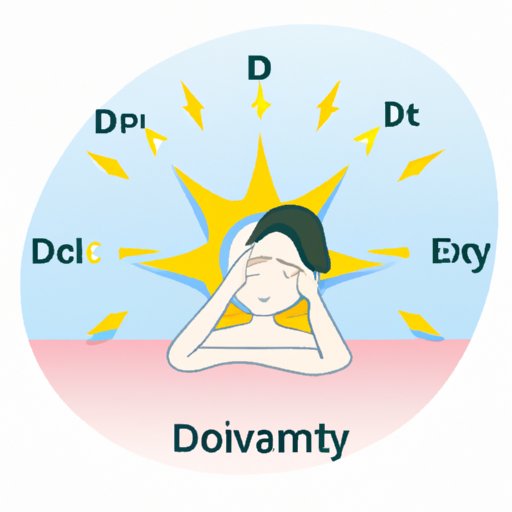Introduction
Vitamin D is an essential nutrient that helps our bodies absorb calcium and supports bone health. It’s also important for proper functioning of our immune system and overall health. But did you know that low levels of vitamin D can also cause fatigue and tiredness? This article will explore the link between low vitamin D and fatigue, discuss how to combat tiredness caused by low vitamin D levels, and provide recommendations for treating low vitamin D and tiredness.

Exploring the Link Between Low Vitamin D and Fatigue
Fatigue is one of the most common symptoms of low vitamin D levels. Low vitamin D has been linked to chronic fatigue syndrome and fibromyalgia, two conditions that cause extreme exhaustion and difficulty sleeping. Low vitamin D has also been associated with depression, which can lead to feelings of fatigue. Other possible symptoms of low vitamin D include muscle pain, joint pain, and weakened bones.
It’s important to note that many other factors can cause fatigue, so it’s important to consult a doctor if you suspect that you may have low vitamin D. Your doctor can do a simple blood test to measure your vitamin D levels and determine if they are low.

How to Combat Tiredness Caused by Low Vitamin D Levels
The good news is that there are several ways to increase your vitamin D levels and reduce fatigue. Here are some simple tips to help you get started:

The Role of Vitamin D in Regulating Energy Levels
Vitamin D plays a crucial role in regulating energy levels in the body. It helps the body absorb calcium, which is important for healthy bones and muscles. Vitamin D also helps the body produce hormones like serotonin and dopamine, which play a role in regulating mood, sleep, and energy levels.
Simple Ways to Increase Your Vitamin D Intake to Avoid Feeling Tired
In addition to getting regular sun exposure, there are several other ways to increase your vitamin D intake. Eating foods rich in vitamin D, such as fatty fish, egg yolks, and mushrooms, is a great way to boost your vitamin D levels. Supplements are also available for those who want to quickly increase their vitamin D intake.
It’s also important to make sure you’re getting enough exercise. Exercise helps your body produce endorphins, which can give you a natural energy boost. Additionally, making sure you’re getting enough sleep is key to avoiding fatigue. Aim for at least seven to nine hours of sleep each night.
Conclusion
Low vitamin D levels can cause fatigue and tiredness. However, there are several ways to increase your vitamin D intake and reduce fatigue. Getting regular sun exposure, eating foods rich in vitamin D, taking supplements, exercising regularly, and getting enough sleep are all effective ways to combat tiredness caused by low vitamin D levels. With these tips, you can make sure your vitamin D levels stay within a healthy range and avoid feeling fatigued.


